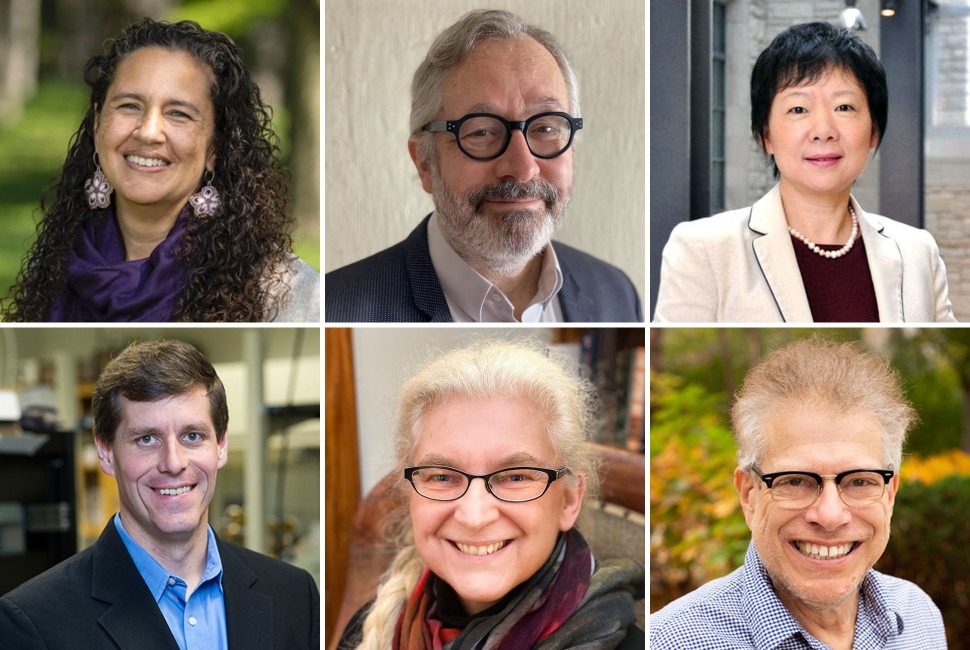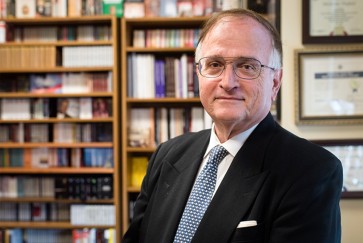Six members of the Northwestern University faculty have been elected members of the American Academy of Arts and Sciences, one of the nation’s oldest and most prestigious honorary societies.
Megan Bang, Bruce Carruthers, Wei Chen, Mark C. Hersam, Suzan van der Lee and Uri J. Wilensky are among the 250 members elected in 2024. They are recognized for their excellence and commitment to uphold the Academy’s mission of engaging with professions across different perspectives.
“We honor these artists, scholars, scientists and leaders in the public, non-profit and private sectors for their accomplishments and for the curiosity, creativity and courage required to reach new heights,” said David Oxtoby, president of the Academy. “We invite these exceptional individuals to join in the Academy’s work to address serious challenges and advance the common good.”
Founded in 1780 by John Adams, John Hancock and others, the Academy was founded on ideals that celebrate the life of the mind, the importance of knowledge and the belief that the arts and sciences are “necessary to the interest, honor, dignity and happiness of a free, independent and virtuous people.”
Northwestern’s newest members are:
Megan Bang
Megan Bang is a professor of the learning sciences and director of the Center for Native American and Indigenous Research at Northwestern’s School of Education and Social Policy.
Bang has spent much of her career studying what teaching and learning could and should look like in a world with a changing climate and human cognition as it relates to sustainability.
She focuses on reasoning and decision-making about complex socio-ecological systems in ways that intersect with culture, power and historicity. Central to this work are dimensions of identity, equity and community engagement. She works closely with Indigenous communities to create new systems of education. She has taught in and conducted research in teacher education as well as leadership preparation programs. Bang currently serves on the Board of Science Education at the National Academy of Sciences and is a member of the National Academy of Education where she is currently serving as a board member as well.
Bruce Carruthers
Bruce Carruthers is the John D. MacArthur Professor of Sociology at Weinberg College of Arts and Sciences.
Carruthers is involved in the graduate Comparative Historical Social Science (CHSS) workshop and the Kellogg-Sociology joint Ph.D. program. His current research projects include a comparative study of the institutional foundations of long-term decision-making, the adoption of “for-profit” features by U.S. museums, the relationship between corporate taxation and corporate social responsibility, and how “big data” affects credit markets.
He has had visiting fellowships at the Russell Sage Foundation, the Radcliffe Institute for Advanced Study, the Wissenschaftskolleg zu Berlin, the Library of Congress and the Swedish Collegium for Advanced Study. He has also received a John Simon Guggenheim Fellowship. Currently, he is a non-resident long-term fellow at the Swedish Collegium.
Wei Chen
Wei Chen is the Wilson-Cook Professor of Engineering Design, professor of mechanical engineering and chair of the department of mechanical engineering at the McCormick School of Engineering.
A member of the National Academy of Engineering, Chen has made important contributions to simulation-based design under uncertainty and decision-based design. Chen’s research aims to develop rational and computationally efficient design methods based on data science, optimization, statistical inference and decision analysis for use in engineering design and manufacturing problems. Her current research focuses on the use of artificial intelligence and uncertainty quantification techniques for design of emerging materials systems including microstructural materials, metamaterials and programmable materials.
Chen’s many awards include the Charles Russ Richards Memorial Award from the American Society of Mechanical Engineers (ASME), Engineering Science Medal from the Society of Engineering Science (SES), ASME Design Automation Award, Northwestern’s 2018 Ver Steeg Faculty Award and Pi Tau Sigma Gold Medal Achievement Award. She served as editor-in-chief of the Journal of Mechanical Design, president of the International Society for Structural and Multidisciplinary Optimization (ISSMO) and chair of the ASME Design Engineering Division. She is a fellow of ASME.
Mark Hersam
Mark Hersam is the Walter P. Murphy Professor of Materials Science and Engineering at McCormick, chair of the department of materials science and engineering and director of the Northwestern University Materials Research Science and Engineering Center.
A member of the National Academy of Engineering, Hersam studies nanomaterials, nanomanufacturing, scanning probe microscopy, nanoelectronics devices, biosensors, renewable energy and quantum information science. This work has led to more effective and sustainable nanomaterials for electronics, energy storage and medicine.
Hersam has received numerous honors, including the Presidential Early Career Award for Scientists and Engineers, TMS Robert Lansing Hardy Award, American Vacuum Society Peter Mark Award and Medard W. Welch Award, Materials Research Society Outstanding Young Investigator Award and Mid-Career Researcher Award, U.S. Science Envoy, the MacArthur Fellowship and eight Teacher of the Year Awards. An elected member of the National Academy of Inventors, he has founded two companies, NanoIntegris and Volexion, which are commercial suppliers of nanoelectronic and battery materials, respectively.
Suzan van der Lee
Suzan van der Lee is the Sarah Rebecca Roland Professor of Earth and planetary sciences at the Weinberg College of Arts and Sciences.
An observational seismologist, Van der Lee applies data science to millions of records of seismic signals extract insights about earthquakes and the ongoing dynamics within the Earth’s interior. By studying the Earth’s interior structure, Van der Lee aims to reveal the effects of the geodynamic forces that lead to planetary cooling, plate tectonics, continental rifting, subduction zones, volcanism, mountain building, all types of earthquakes and more. She is particularly interested in how plate tectonics started, is sustained and how it will end.
Van der Lee has led numerous big-data analyses and seismological data acquisition field experiments in Africa, the Americas and Europe. She previously served on the board of directors of the EarthScope Consortium, is former president of the seismology section of the American Geophysical Union and is principal director of the Metropolitan Chicago Data Science Corps and NU-Geopaths. She also co-developed Earthtunes, an iOS app that transforms seismic frequencies into audible pitches. The app soon will be available for Android phones.
Uri J. Wilensky
Uri J. Wilensky is the Lorraine H. Morton Professor of Learning Sciences and Computer Science at the School of Education and Social Policy and the McCormick School of Engineering.
He is the founding director of the Center for Connected Learning and Computer-Based Modeling, founding co-director of the Computer Science/ Learning Sciences joint Ph.D. program and co-founder of the Northwestern Institute on Complex Systems. He was an early advocate of integrating computation into all school subjects and has authored numerous computational science curricula.
Wilensky seeks to use computer technology to help people in managing and understanding the increasingly complex world (both natural and social) we live in. Wilensky’s award-winning NetLogo is designed to help scientists, policymakers, citizens and learners navigate that complexity. NetLogo is the most widely used agent-based modeling environment, with hundreds of thousands of users and many thousands of scientific publications. Wilensky's theory of restructurations describes how knowledge and learning change in the context of computation and its implications for making sense of complexity.


